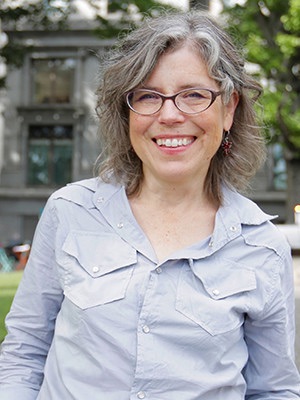By Daniel Myers
Phi Beta Kappa member and former public defender Lisa Daugaard has been awarded a MacArthur grant for working to reform policing and criminal justice. Daugaard was highlighted by the MacArthur Foundation specifically for her work in developing LEAD, or Law Enforcement Assisted Diversion, a program which seeks to redefine the pathway for people who may be homeless or struggling with substance abuse away from prison and, instead, towards getting the resources and help they need.
Daugaard was inducted into Phi Beta Kappa in 1983 at the University of Washington. After graduating, she went on to pursue a master’s degree in government at Cornell University, but an experience during her time there changed her career path from government to law. According to the Seattle-based media site C is for Crank, Daugaard was studying the criminalization of homelessness at Cornell when she began defending activists arrested or deported during South Africa’s apartheid-era; the experience called her to law school to begin a “a career trajectory where [activism] was the work rather than a distraction from the work.” Her next logical step was to pursue a J.D. from Yale Law School, going on to practice law soon thereafter.
Entering the field of law in the mid-1990s, Daugaard litigated a diverse portfolio of cases in the latter half of the decade, from defending the homeless in New York City being targeted to do outreach to other homeless people for $1 an hour to shutting down the Guantanamo Bay internment camp for HIV+ Haitian refugees. After this early work, Daugaard became a public defender, which led her to become deputy director of The Defender Association from 2007-2013 and then deputy director of the King County, Washington Department of Public Defense until 2015.
Daugaard is now the director of the Public Defender Association, a non-profit legal corporation that advocates for justice system reform and develops alternatives that shift from a punishment paradigm to a system that supports individual and community health. In her tenure as director, Daugaard has spearheaded their LEAD program. Police officers who come in contact with someone struggling to break a cycle of drug abuse or other offenses can refer the individual to the LEAD program, and within 30 minutes a social worker will be on the scene to begin the process. This process, which includes identifying treatments and services that will help them stay out of the criminal justice system, has seen noticeable results.
By most metrics, LEAD has been successful in Seattle and boasts some promising statistics: not only have those admitted to LEAD been 58% less likely to offend again, but, according to Daugaard’s interview with the MacArthur Foundation, the program is also a less costly alternative to traditional, more punitive methods. LEAD’s success has certainly drawn attention—more than 59 jurisdictions, including many major U.S. cities, are piloting or fully launching LEAD, and more than 40 are creating the infrastructure to begin. The hope is that the results seen in Seattle can be replicable in other cities. Given LEAD’s early success, the future of the program in Seattle and across the country looks promising.
Daniel Myers is a recent graduate of the College of Wooster with a bachelor’s degree in English and theatre and dance. The College of Wooster is home to the Kappa of Ohio chapter of Phi Beta Kappa.




